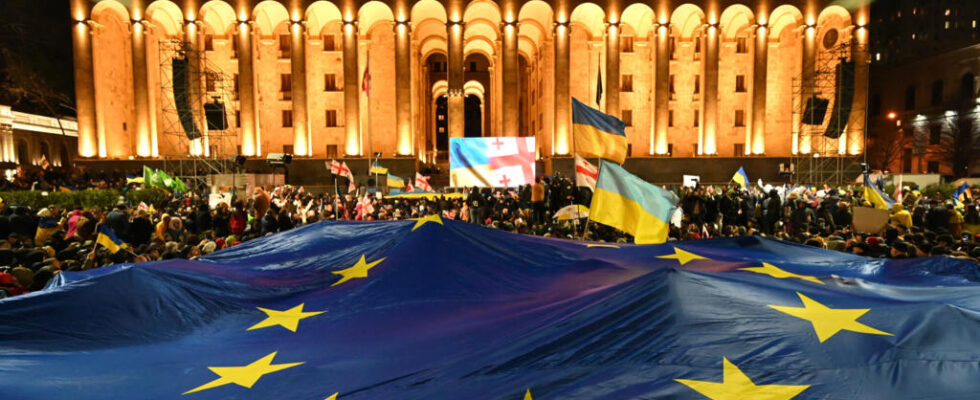In the former Soviet republic of Georgia, the parliament is currently considering a bill on ” foreign officials “. A project baptized by opponents and civil society as ” russian law », in a context of political rapprochement with Russia. While many Russian opponents had taken refuge in the country since the start of the war in Ukraine, Georgia is tightening the screw, refusing them entry.
From our correspondent in Tbilisi,
The bill consists of obliging civil society organizations or the media that receive foreign funding to declare themselves “ agents of foreign influence on their official documents or at the top of the articles they publish. Most NGOs, Georgian media and many civil society figures denounce it as a means of crushing the ideas and values promoted by the West in Georgia.
This law is called ” russian law » by its detractors because it seems to them to be directly inspired by the Russian law on foreign officials » Adopted in 2012. The party ” Georgian dream in power, of the oligarch Bidzina Ivanishviliwho made his entire fortune in Russia, says he is inspired by American law: the ” Foreign Agents Registration Act “.
But that doesn’t fool anyone in the South Caucasus country: the ” Georgian dream » multiplies the signs of rapprochement with Russia for several years.
Anti-Western rhetoric, refusal of Russian opponents
Other signs of rapprochement with Russia are legion, notably with constant anti-Western rhetoric for two years.
According to this narrative, the United States and Europe would like to force Georgia to become a second front in the war in Ukraine, dragging the Georgians towards the total destruction of their country. This with repeated attacks on key institutions and values if we want to get closer to the EU… like freedom of the media or secularism.
And then gestures aimed at pleasing Moscow, whether it be adopting very critical positions towards Ukraine and its leaders or talking about resuming air flights between Russia and Georgia.
Last small act to date: the rejection at the airport of Russian opponents who came to take refuge in Georgia after the start of the large-scale invasion of Ukraine. A few days ago, it was Anna Rivina – a human rights lawyer and activist against domestic violence – and journalist Filipp Dzyadko who were not allowed to return to Georgia, where they had installed last year.
Danger of an authoritarian anti-Western drift, despite the majority desire for EU membership
With this ” russian law “, the country could experience an authoritarian drift, like Russia for nearly twenty years. There is an exit strategy from the ” european way “, that yet support three quarters of Georgiansat least.
Moreover, other aspects of Georgian political life could become Russified. 2023 will be a crucial year, as Europe is giving itself until the end of the year to decide whether or not to grant to Georgia the status of candidate to the EU: last June, Brussels asked Tbilisi to meet 12 points to do so.
Everything indicates that this will not happen, despite a population that has been dreaming overwhelmingly of Europe for three decades.
► Also read and listen: Mikheil Saakashvili, a former president behind bars
